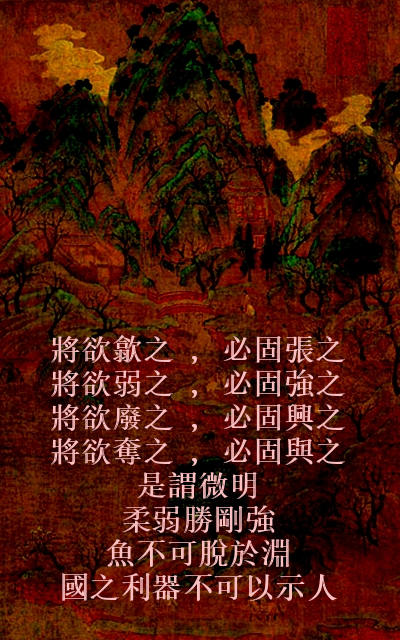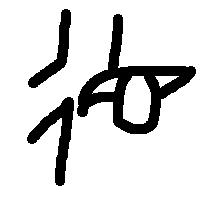道德 Tao Virtue #10

© Tao Virtue - bone structure of Daodejing #36 (English commas added).
Pattern: 8 Days Zen Guqin.
Copyright ©2019 April 02, 2019
Briefly spoken of in a previous article, the 德 (dé ) word is often given the English synonyms of 'character, ethics, favor, goodness, heart, kindness, mind, morals, virtue' plus several others. None of the English synonyms have meaning... western philosophy has debated, for about three-thousand years, what 'ethics' and the other words might mean... three-thousand years of academic-scholarly debates, and still no answers — none of the individuals were able to describe the words from a firsthand point of view — which permanently proves that the words' meanings are unknown in English, indescribable, and, therefore, if unknown, then the unknown English words cannot, and do not, usefully translate the Chinese word 德.
If an individual is not able to self-observe, not able to self-think, and not able to 'divide one oneself', then, the individual is not able to know what any English word implies, nor know what the individual's own words mean, and the individual cannot usefully translate any language, foreign or domestic.
All known academic translations of Daodejing, use unknown modern English words, while claiming the unknown modern English words to be flawlessly perfect translations of an ancient foreign culture's language.
彳 (chì) implies 'walk slowly'... walking slowly, itself, implies mindfulness, self-awareness, self-consciousness, and self-carefulness... to be self-aware of one's own steps...
十 (shí) commonly implies the number '10'... can also imply 'complete, decade, perfect, topmost, the perfect number'... the symbol strokes, composed of 一 (yī), which can imply the number '1', or point to 'all, alone, once, single' or other singular things... also composed of 丨 (shù), which can imply 'go through up and down, pierce'.
罒 (wǎng), is said to be a variant of 网... sometimes said to infer 'eyes', sometimes said to imply a 'net'... perhaps no one really knows for sure what the symbol implied thousands of years ago...
Next, is again 一 (yī), which can imply the number '1', or point to singular things.
心 (xīn), or 忄 when used as a side symbol, often implies 'heart', but can also sometimes imply 'bosom, center, core, feeling, intelligence, thinking', depending on sentence use.
As a concept, 德 might imply 'careful steps, ten eyes, one heart (or 'straight heart')'... the chosen concept, will, of course, reflect one's own life, as well as reflect one's own ability to self-observe and to self-think.
What if, 'small steps, ten nets, one heart'? Maybe plausible, but not probable, because the 'ten nets' concept's use within the sentences does not relate to the sentence's patterns.
One translation interpreted 德 to imply something like 'ten eyes of people looking at a straight thing and having a mutual agreement of the thing being straight'... the translation's concept, an attempt of force-fitting a modern academic 'social peer review'... the result, not favorable...

The older oracle script of the alleged 'same word', is shown within some reference materials to have 'two steps', plus 'pass through', plus what appears to be an 'eye'. The oracle script might, today, be interpreted to imply something like 'small steps of what passes through the eye (or mind)', thereby simply implying 'cautiously careful steps'. However, the 丨 (shù) oracle symbol is said to also imply '10', which then matches the later scripts' use of 十 (shí), and again returns the concept to be like 'small steps, ten eyes'... although, the oracle symbolism, when related to what is real, and not merely imply a phonetic word, can imply something else entirely different... perhaps what Laozi had intended to imply...
Why ten eyes? Plausibly, it may have implied the five gods of ancient Asian cultures... careful steps, while being watched, which also presents the concept of 'virtue' being an external outsider behavior that submits to outsider approval, not being an internal inside nature, nor being an external behavior that submits to one's own inner standards. Much like today, and within western philosophy, psychology, physics, and all known other fields, the idea of 'virtue', 'ethics', 'benevolence' and 'morals', are all only judged relative to external behaviors, with no emphasis upon one's own internal natures.
Today, in modern cultures, it remains common for people to choose their own steps to be submissive to social opinion... social eyes... social approval... without choosing their own steps to be the outward expression of the people's inner conscious convictions of right and wrong... no self-thinking...
If, cannot divide one oneself, then, not able to self-create inner conscious convictions of right and wrong... then, can only submit to popular social opinion... can only submit to the lowest common denominator of society...
Within the ancient Chinese texts, almost always the word 德 is used relative to submission of cultural social opinion... what might today be better presented to be like 'submission to popular cultural opinions of the moment... and the cultural opinions will dramatically change many, many times each year'. The acceptance of submissiveness to cultural social opinion, is, itself, an act of being a wishy-washy mediocre nothingness person, of no value beyond being an animal of burden.
The 'Laozi' words, first ever seen before 1980, that did not use 德 to imply submissiveness to outsiders. All known academic translations of Daodejing, fully missed Laozi's sentences... all academic translations except one, even missed the core word... the core word being one of the topmost important words within the Chinese language... the academic translations, simply omitted the word entirely. Only one translation seen, that attempted to translate the core word... the translation failed, of course, because of the translator not knowing what self-thinking is, but, at least the translator did attempt to make sense of an unknown... the translator earned a zillion brownie points for trying...
Comparing several variances of Chinese scripts to the pattern of how Laozi presented his sentences, 德 appears to be the more modern translation of one of the many variances of scripts that were different for different regions, and perhaps written closer to the oracle style, which would have more closely matched Laozi's concept of 'mind', of self-thinking... perhaps, something, more like 'small careful 'steps' of thoughts, pass through mind'... the word itself, being defined relative to what the sentence's other words implied...
Many people reach to hold Daodejing because of the people believing that Daodejing promises mystical magical superpowers of nothingness oneness with the nothingness oneness of Source... all selfish... all of selfish hunger... the people not knowing, nor caring, nor wanting to do any thinking on their own... not wanting, nor willing, to participate in their own lives...
If not know what 'virtue' means, then able to write incoherent nonsense like "The Master said, "It is only the (truly) virtuous man, who can love, or who can hate, others."" (James Legge's translation of 里仁 Li Ren #3.)
All academic translations of Daodejing are similarly void as Legge's, because, the word 'virtue' has no meaning in English... because, people not self-think.